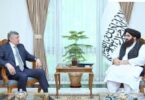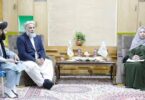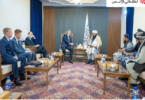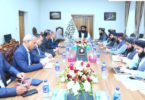Monitoring Desk
KABUL: Foreign Minister Salahuddin Rabbani has urged Economic Cooperation Organization (ECO) member states to use bilateral and multilateral leverage to help stabilise Afghanistan.
A statement from the Ministry of Foreign Affairs (MoFA) on Tuesday quoted Rabbani as saying: “The sooner the Taliban accept our peace offer to end the war through dialogue, the earlier the ECO region will be able to fully focus on our common economic agenda,”
Rabbani told the 23rd meeting of the Council of Foreign Ministers of ECO in Dushanbe without peace in the heart of the Asia region — the very roundabout of which is Afghanistan — the ECO members would not reach their full economic growth potential. He recalled that last year’s Summit took note of this fact, and member states reaffirmed their commitment to the long-term stabilization and sustainable development of Afghanistan.
“In this connection, I wish to highlight the recent Afghanistan Pakistan Summit in Kabul where Prime Minister of Pakistan Shahid Khaqan Abbasi firmly committed to supporting the Afghan- led and Afghan owned peace process.”
“We also agreed to undertake effective action against fugitives and the irreconcilable elements, who will continue posing security threats to our two countries, as well as to the rest of the region,” he said.
He said Afghanistan looked forward to the full implementation of the Afghanistan-Pakistan Action Plan for Peace and Solidarity (APAPS) – which is an overdue step forward towards stabilization of Afghanistan for helping ensure regional security.
“To reinforce our peace efforts for prosperity at home and throughout the ECO-region, we welcome with appreciation, the establishment by the ECO Member- States an Advocacy Program for Afghanistan,” he said.
This resulted from summit last year when ECO Member- States renewed their “strong desire for a secure, prosperous and peaceful Afghanistan,” supporting the objectives of our National Peace and Development Framework (ANPDF).
“We also welcome the two principles of the ECO Advocacy Program for Afghanistan: complementarity and favorable treatment.”
Both principles would guide ECO’s assistance to Afghanistan, as well as the execution of the ECO Fund for Afghanistan, in accordance with the economic reforms and policy priorities of Afghanistan that fully support our collective agenda under ECO.
Rabbani said Afghanistan was fully subscribed to the ECO Vision 2025 and continued doing our part to implement the core objectives and priorities of the Vision in line with its three principles of: sustainability, integration, and conducive environment.
Cooperation- in the areas of trade, transport, connectivity, energy, tourism, economic growth and productivity, social welfare and environment- lied at the top of the sustainable development agenda of the National Unity Government of Afghanistan he added.
In each of these areas, more reforms were implemented and more policy and legal initiatives and measures were taken last year to help integrate our country with the ECO-region.
“In turn, this work- in- progress has helped facilitate the implementation of our common objectives enshrined in the ECO strategies for sustainable economic growth in the region.
“Through the Heart of Asia-Istanbul and RECAA Processes, we have actively promoted regional connectivity via Afghanistan and successfully secured regional cooperation to help expedite the implementation of such critically important connectivity projects such as TAPI, CASA-1000, the Five-Nation Railway, as well as the operationalization of the Chabahar Port and the Lapis Lazuli Route Agreement,” the foreign minister said.
“Our economy is being transformed, as we have passed unprecedented economic legislation- opening opportunities across new sectors and reducing bureaucratic bottlenecks that encourages regional and global businesses to invest in Afghanistan’s virgin markets.”
“Consequently, we have signed more than $500 million in investment contacts since the start of this year, while we estimate a boost in our GDP growth from 2.5% to 4% in the coming years,” he noted.






